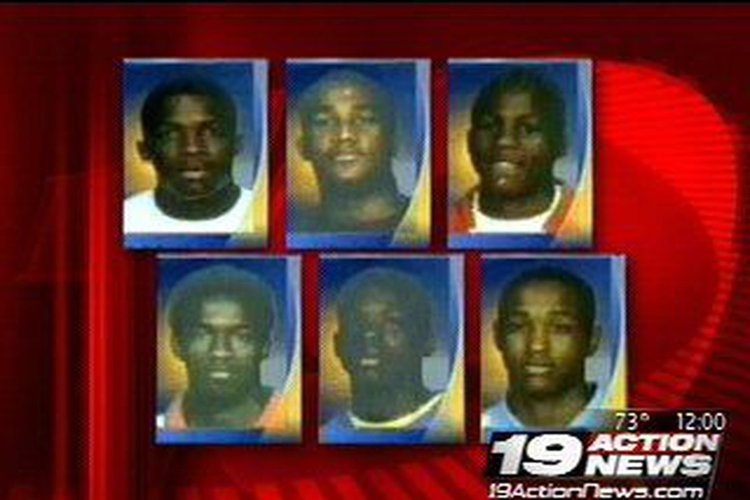
By Steve Sailer
03/23/2008
From his speech at Howard U:
What’s truly risky is to let the same injustice remain year after year. What’s truly risky is to walk away and pretend it never happened. What’s truly risky is to accept things as they are instead of working for what could be. In a media-driven culture that’s more obsessed with who’s beating who in Washington and how long Paris Hilton is going to jail, these moments are harder to spot today. But every so often, they do appear. Sometimes it takes a hurricane. And sometimes it takes a travesty of justice like the one we've seen in Jena, Louisiana.There are some who will make Jena about the fight itself. And it’s true that we have to do more as parents to instill in our children that violence is always wrong. It’s wrong when it happens on the streets of Chicago and it’s wrong when it happens at a schoolyard in Louisiana. Violence is not the answer. Non-violence was the soul of the Civil Rights Movement, and we have to do a better job of teaching our children that virtue.
But we also know that to truly understand Jena, you have to look at what happened both before and after that fight. You have to listen to the hateful slurs that flew through the halls of a school. You have to know the full measure of the damage done by that arson. You have to look at those nooses hanging on that schoolyard tree. And you have to understand how badly our system of justice failed those six boys in the days after that fight — the outrageous charges; the unreasonable and excessive sentences; the public defender who did not call a single witness.
Like Katrina did with poverty, Jena exposed glaring inequities in our justice system that were around long before that schoolyard fight broke out. It reminds us of the fact that we have a system that locks away too many young, first-time, non-violent offenders for the better part of their lives — a decision that’s made not by a judge in a courtroom, but by politicians in Washington. It reminds us that we have certain sentences that are based less on the kind of crime you commit than on what you look like and where you come from. It reminds us that we have a Justice Department whose idea of prosecuting civil rights violations is trying to rollback affirmative action programs at our college and universities; a Justice Department whose idea of prosecuting voting rights violations is to look for voting fraud in black and Latino communities where it doesn’t exist. …
I don’t want to be standing here and talking about another Jena four years from now because we didn’t have the courage to act today. I don’t want this to be another issue that ends up being ignored once the cameras are turned off and the headlines disappear. It’s time to seek a new dawn of justice in America.
From the day I take office as President, America will have a Justice Department that is truly dedicated to the work it began in the days after Little Rock. I will rid the department of ideologues and political cronies, and for the first time in eight years, the Civil Rights Division will actually be staffed with civil rights lawyers who prosecute civil rights violations, and employment discrimination, and hate crimes. And we'll have a Voting Rights Section that actually defends the right of every American to vote without deception or intimidation. When flyers are placed in our neighborhoods telling people to vote on the wrong day, that won’t only be an injustice, it will be a crime.
As President, I will also work every day to ensure that this country has a criminal justice system that inspires trust and confidence in every American, regardless of age, or race, or background. There’s no reason that every single person accused of a crime shouldn’t have a qualified public attorney to defend them. We'll recruit more public defenders to the profession by forgiving college and law school loans — and I will ask some of the brilliant minds here at Howard to take advantage of that offer. There’s also no reason we can’t pass a racial profiling law like I did in Illinois, or encourage state to reform the death penalty so that innocent people do not end up on death row.
What really happened:
Similarly, in September, when Jesse Jackson and Al Sharpton led thousands of demonstrators in a march on the small town of Jena, Louisiana to protest supposed racism in the treatment of six black high-school students accused of beating unconscious then stomping the body of a white schoolmate, the assembled national media got the story almost 180 degrees backward. We weren’t witnessing a revival of the Emmett Till Era of lynchings, as the pundits insisted, but another example of the O.J. Simpson Age of stars athletes whose off-field misdeeds are excused until they finally go too far.
The Jena Six hadn’t been despised outcasts: they were the best football players in a gridiron-obsessed small town. Mychal Bell, the only one of the Six tried so far, was an All-State junior who scored 18 touchdowns in the 2006 season. A local minister, Eddie Thompson, explained, “For the most part, coaches and other adults have prevented them from being held accountable for the reign of terror they have presided over in Jena.” As Abbey Brown wrote in the Alexandria-Pineville Town Talk: “Bell was adjudicated–the juvenile equivalent to a conviction–of battery Sept. 2 [2006] and criminal damage to property Sept. 3. … A few days later, on Sept. 8, Bell rushed 12 times for 108 yards and scored three touchdowns.”
This is a content archive of VDARE.com, which Letitia James forced off of the Internet using lawfare.